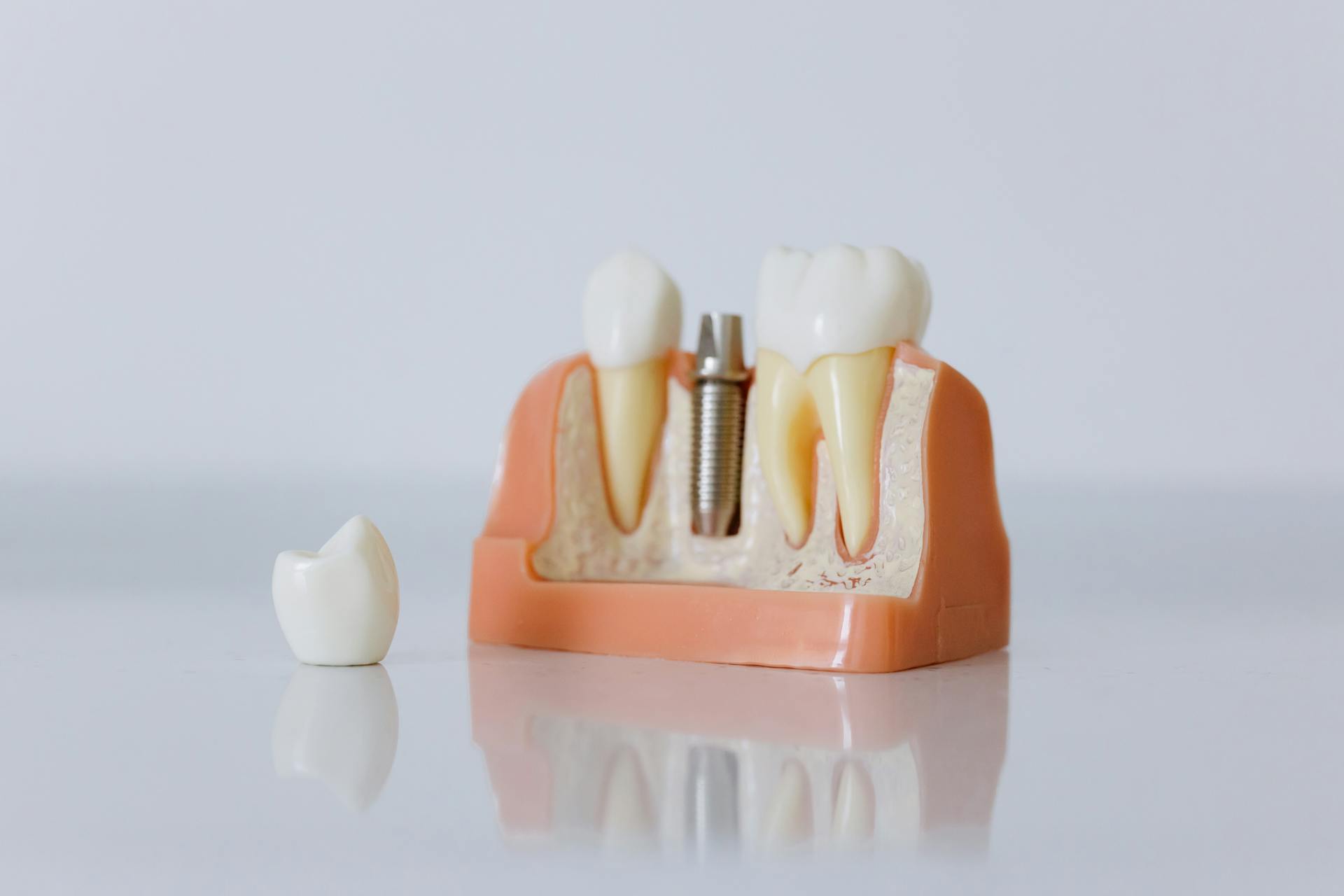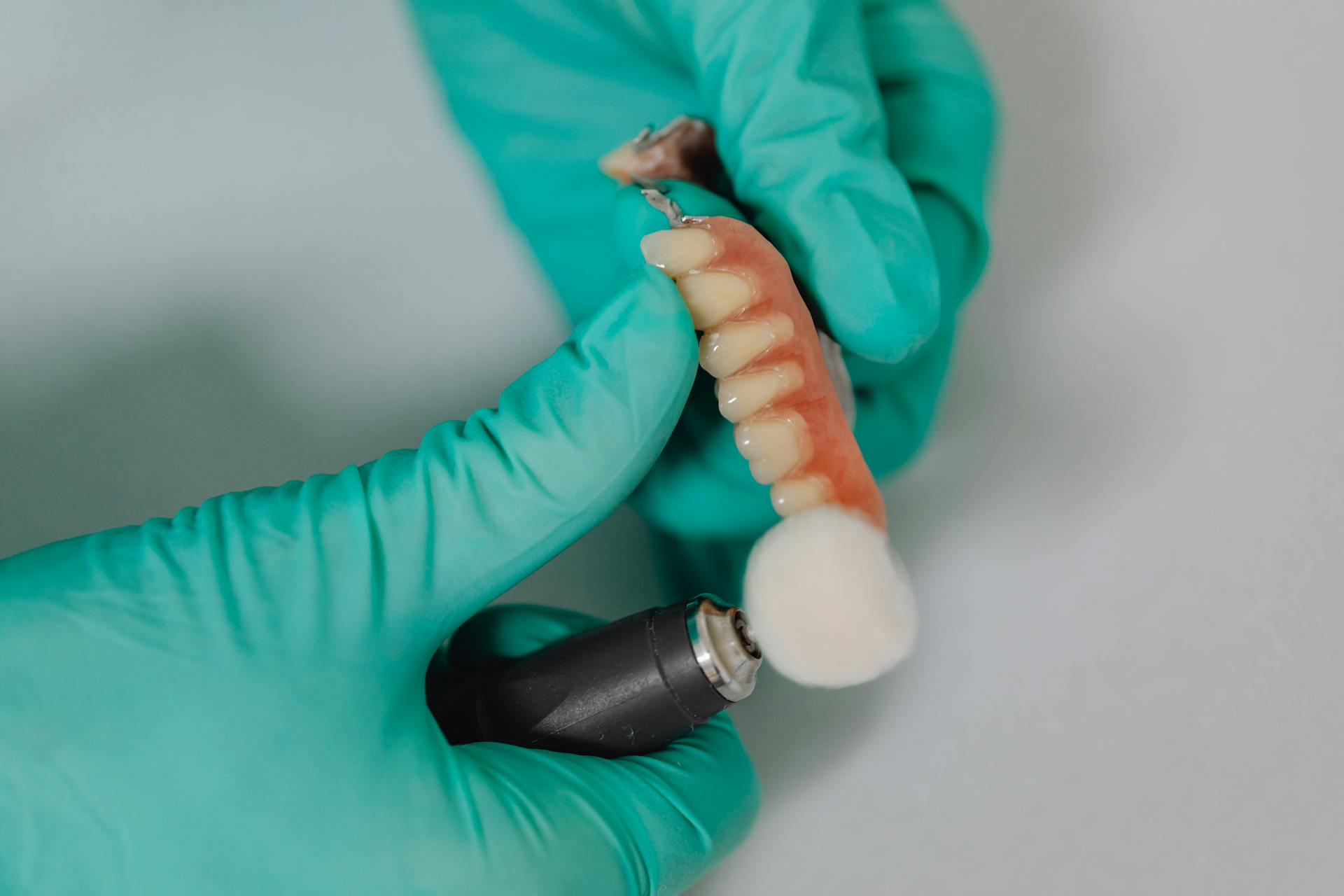
Teeth implants are a type of prosthetic that is used to replace one or more missing teeth. They are usually made from titanium and are placed into the jawbone to act as artificial roots. Once in place, they can be used to support a dental crown, bridge, or denture.
Teeth implants are usually considered to be a very successful treatment option for tooth loss. In fact, they have a success rate of over 95%. However, there are a few things that can go wrong with teeth implants and it’s important to be aware of them before undergoing treatment.
The most common complication associated with teeth implants is surgical site infection. This can occur when bacteria gets into the implant site and causes an infection. Surgery site infections are usually treated with antibiotics.
Another possible complication is implant failure. This occurs when the implant doesn’t fuse to the bone correctly or when the implant becomes loose. Implant failure can lead to the implant falling out or shifting in the jaw.
In rare cases, teeth implants can also cause nerve damage. This usually happens if the implant is placed too close to the nerve. Nerve damage can cause numbness, tingling, or pain in the implant area.
If you’re considering teeth implants, it’s important to talk to your dentist about the risks and benefits. They can help you decide if implants are the right treatment option for you.
What are the benefits of teeth implants?
Teeth are an important part of our overall health, and they play a big role in our daily lives. They help us to eat and speak properly, and they also play a part in our self-esteem. When we lose teeth, it can have a big impact on our lives, both physically and emotionally.
Teeth implants are one option for people who have lost teeth. They are a permanent solution that can give you back your smile and your confidence.
There are many benefits of teeth implants, including:
•Improved appearance: Teeth implants look and feel just like your own natural teeth. They are also permanently attached to your jawbone, so they will not move around like dentures can.
•Improved oral health: Because teeth implants are attached to your jawbone, they help to keep your bone healthy and strong. They also do not require special care, so you can brush and floss them just like your natural teeth.
•Improved self-esteem: Losing teeth can be a big blow to your self-esteem. Teeth implants can help you to feel better about yourself and your smile.
•Improved quality of life: Teeth implants can help you to eat and speak properly. They can also make it easier to find a job and keep a social life.
The decision to get teeth implants is a personal one. You should talk to your dentist about whether or not they are right for you.
Suggestion: Natural Color
Are teeth implants painful?
There is some pain associated with getting teeth implants, but it is usually minimal and can be easily managed with over-the-counter or prescription medication. The majority of patients report that the worst part of the procedure is the numbing injections, which can cause some discomfort. Once the numbing medication takes effect, the procedure is relatively pain-free.
How long do teeth implants last?
Teeth implants are a great way to restore your smile if you have missing or damaged teeth. They are also a very popular choice for people who want to improve their appearance and boost their confidence. But how long do teeth implants last?
Teeth implants are made from high quality materials that are designed to last for many years. With proper care and maintenance, your teeth implants can last a lifetime. However, it is important to keep in mind that teeth implants are not immune to wear and tear and they can be damaged just like your natural teeth.
One of the most important things you can do to ensure the longevity of your teeth implants is to practice good oral hygiene. This means brushing and flossing your teeth regularly and visiting your dentist for regular check-ups and cleanings.
It is also important to avoid habits that can damage your teeth implants such as biting your nails, chewing on hard objects, or using your teeth as tools. If you play sports, it is important to wear a mouthguard to protect your teeth implants from impact.
In some cases, teeth implants may need to be replaced after a few years. This is usually due to damage or wear and tear. If your teeth implants do need to be replaced, your dentist will work with you to ensure that your new implants match your existing teeth and blend in seamlessly.
Overall, teeth implants are a great way to improve your smile and your confidence. With proper care, they can last a lifetime.
Suggestion: Can All Teeth Be Replaced with Implants?
What is the success rate of teeth implants?
The success rate of teeth implants is often difficult to determine due to the many variables involved. However, studies have shown that the overall success rate of teeth implants is about 95%. This means that out of every 100 teeth implants placed, 95 will be successful.
There are many different factors that can affect the success rate of teeth implants, such as the type of implant used, the skill of the implant dentist, the health of the patient, and the placement of the implant. For example, a study published in the Journal of Oral & Maxillofacial Surgery found that the success rate of teeth implants was 96.2% when the implants were placed in the anterior maxilla (front of the upper jaw), but only 89.4% when the implants were placed in the posterior mandible (back of the lower jaw).
It is important to note that the success rate of teeth implants can vary depending on the definition of success. For example, some studies define success as the implant being in place for at least 1 year, while others define success as the implant being in place and functional for at least 5 years.
Overall, the success rate of teeth implants is high, with a 95% success rate being reported in most studies. However, it is important to consult with a qualified implant dentist to determine if teeth implants are right for you.
Are there any risks associated with teeth implants?
Yes, there are potential risks associated with teeth implants. While the procedures are generally safe, complications can occur. These can include infection, damage to surrounding teeth, nerve damage, and sinus problems. In very rare cases, implant surgery has been linked to cancer.
The placement of teeth implants requires a surgical procedure. This means that there is always a risk of infection, bleeding, and pain. In some cases, the implant may not fuse properly with the bone, which can cause it to become loose. There is also a small risk that the implant could puncture a blood vessel or damage a nerve.
Smokers and people with diabetes are at a higher risk for implant complications. This is because they are more likely to develop infections. People with certain medical conditions, such as cancer, autoimmune diseases, and bleeding disorders, may not be good candidates for implants.
Most people who get teeth implants experience little to no discomfort. However, some may experience soreness, swelling, and bruising. These side effects are usually mild and resolve on their own within a week or two.
If you are considering teeth implants, it is important to talk to your dentist about the potential risks and benefits. They can help you decide if implants are right for you.
See what others are reading: Why Are My Teeth Not Whitening?
How much do teeth implants cost?
Tooth implants are a way to replace missing teeth. They are placed in the jawbone where the tooth is missing. They are made of titanium, which is a metal that is compatible with human bone. The implant is placed in the jawbone and allowed to heal for several months. Once the implant has healed, a post is placed in the implant and a tooth is placed on the post.
The cost of tooth implants can vary depending on the number of teeth that are being replaced and the location of the implant. The average cost of a single tooth implant is $3,000 to $4,000. The cost of implant surgery can range from $1,000 to $2,000. The cost of the implant, the surgery, and the tooth can range from $5,000 to $13,000.
The cost of dental implants is usually not covered by insurance. However, some insurance plans may cover a portion of the cost. Dental implants are considered to be a cosmetic procedure and are not usually covered by insurance.
If you are missing one or more teeth, tooth implants may be an option for you. Talk to your dentist about the cost of tooth implants and whether they are a good option for you.
A different take: Latera Implant Cost
How should I care for my teeth implants?
If you have teeth implants, it is important to take care of them just as you would your natural teeth. Here are some tips on how to care for your teeth implants:
1. Keep your mouth clean. Be sure to brush your teeth at least twice a day and floss at least once a day. This will help to remove plaque and bacteria from around your teeth and implants.
2. See your dentist regularly. It is important to see your dentist at least once a year for a cleaning and check-up. Your dentist will be able to monitor your implants and make sure they are healthy.
3. Avoid smoking. Smoking can lead to implant failure and other dental problems. If you smoke, it is important to quit.
4. Eat a healthy diet. Eating a diet rich in fruits, vegetables, and whole grains can help to keep your teeth and gums healthy.
5. Avoid grinding your teeth. If you grind your teeth, it can cause damage to your implants. If you think you may be grinding your teeth, talk to your dentist about ways to help prevent it.
6. Wear a mouthguard. If you play sports or engage in any activity where there is a risk of getting hit in the mouth, it is important to wear a mouthguard. This will help to protect your teeth and implants.
By following these tips, you can help to ensure that your teeth implants last for many years to come.
A fresh viewpoint: Why Are My Teeth See Through?
What are the different types of teeth implants?
There are a few different types of teeth implants that are available, and each one has its own set of advantages and disadvantages. The most common types of implants are the endosteal and subperiosteal implants.
Endosteal implants are the most commonly used type of implants, and they are placed directly into the bone. This type of implant is incredibly strong and stable, making it ideal for people who have a lot of wear and tear on their teeth. However, endosteal implants require a large amount of bone to be present in order to be placed, so they are not always an option for people with thinner bones.
Subperiosteal implants are placed under the gum, but on top of the bone. This type of implant is a good option for people who do not have enough bone to support an endosteal implant, but it is not as strong and stable as an endosteal implant. Subperiosteal implants are also more likely to be rejected by the body than endosteal implants.
There are a few other types of implants that are less common, but they each have their own set of advantages and disadvantages. For example, mini implants are smaller than traditional implants and are easier to place, but they are not as strong. Zygomatic implants are placed in the bones of the cheek, but they are very difficult to place and have a high rate of failure.
The type of implant that is best for you will depend on your individual needs and goals. Be sure to discuss all of your options with your dentist or implant surgeon before making a final decision.
Frequently Asked Questions
What is a dental implant?
A dental implant is a metal post that replaces the root portion of a missing tooth. An artificial tooth (crown) is placed on an extension of the post (abutment) on the dental implant, giving you the look of a real tooth.
Can a dental implant be used to replace a tooth?
A dental implant can be used to replace a tooth, but it is not the only option. Dentures and bridges can also be an option for replacing teeth.
What is a 3D dental implant?
A dental implant is a surgical component that interfaces with the bone of the jaw or skull to support a dental prosthesis such as a crown, bridge, denture, facial prosthesis or to act as an orthodontic anchor.
What is the difference between dental crowns and dental implants?
A dental crown is a removable restoration that fits over a missing tooth, while a dental implant is a single-pointed metal screw (or covered pipe) that is inserted into the jawbone to hold a replacement tooth in place.
What is a dental implant and how does it work?
A dental implant is a plastic or metal post that is placed into the bone of your jaw. A artificial tooth is then attached to the post, and your smile looks natural. The implant holds your teeth in place and can provide you with years of oral health.
Sources
- https://www.gilbertarizonadental.com/benefits-of-dental-implants/
- https://www.dentalhealthcentre.co.uk/latest-news/ten-benefits-of-dental-implants/
- https://www.mayoclinic.org/tests-procedures/dental-implant-surgery/about/pac-20384622
- https://www.webmd.com/oral-health/benefits-dental-implants
- https://www.newmouth.com/dentistry/restorative/implants/
- https://www.bupa.co.uk/dental/dental-care/treatments/dental-implants
- https://www.healthdirect.gov.au/dental-implant
- https://www.straussdmd.com/top-10-benefits-dental-implants/
- https://www.smile.com.au/dental-treatments/implants
- https://www.fda.gov/medical-devices/dental-devices/dental-implants-what-you-should-know
- https://www.colgate.com/en-us/oral-health/bridges-and-crowns/tooth-implant-procedure-all-you-need-to-know
- https://www.columbia-smiles.com/dental-blog/5-benefits-of-dental-implants/
- https://www.medicinenet.com/dental_implants/article.htm
- https://en.wikipedia.org/wiki/Dental_implant
- https://www.verywellhealth.com/what-to-expect-during-a-dental-implant-procedure-1059372
Featured Images: pexels.com


